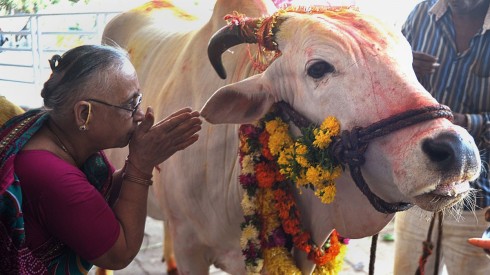Some recent thoughts I’ve had on the study of Hinduism in institutions of higher learning. As usual, pushing for positive changes (adding new viewpoints/ diversity) instead of negative changes (subtracting existing things).
Think about the last time you went to an aquarium. You likely passed by at least one tank that caught your attention – maybe the fish were particularly colorful or diverse. You probably stood around for five minutes or so, looking at the different varieties, pointing them out to your friends. Now imagine those five minutes weren’t enough, and you wanted to dedicate your life to studying some of those fish. You buy a tank, keep it in your study, observe and record what the fish are doing on a regular basis. You come to understand them to some extent. You know what they eat, how they move, perhaps even whether they are in a good mood. But as badly as you want to understand them, even if you were to get inside the tank and swim around, there would just be some things you don’t understand. You will never be a fish.
Far from being an odd trip I just tried to take you on, this analogy explains the current state of Western scholarship on India and Hinduism.

Since my freshman year of undergrad, I have been learning about my religion and country of birth in books written by white, Western scholars. The majority of “renowned” scholarship on Hinduism since the 1700s has been done by European and American scholars. Certainly, some Indian scholars have been doing important and valuable work at Indian universities, but due to the unfortunate power structures of higher learning and a colonial history, Western universities and their published ideas reign supreme. This is compounded, of course, by the fact that those who have immigrated to the US or Europe rarely want their children to study humanities – such things are meant to stay hobbies. Because of the doctor-engineer-lawyer mantra, Indian students in the West are often not in a position to contribute to the academic discourse in powerful Western universities.
This has consequences. While much of the current Western scholarship on Hinduism has produced insightful work and should continue, we need more Hindus studying Hinduism to develop a full, accurate picture of the religion.
In the 1970’s, the term “Orientalism” came about. Back then, it referred to a manner of seeing or studying Eastern societies from a Western lens. Seeing through this Western lens meant having your vision of the East clouded by things like the lingering power dynamics of colonialism, racist undertones, preconceived assumptions about the nature of gender, religion, and relationships, and a desire to “exoticize” the Eastern “other”. The result? If you grow up in the U.S. and learn about Hinduism, you are learning one main message: polytheistic religion that invented caste system and worships cows. While these things are all true to some extent, this is hardly the full picture of the diversity of Hinduism. But these ideas don’t originate in a vacuum! First, scholars of Hinduism espouse certain views on Hinduism. Then these views are distilled by people who oversee textbooks, then perhaps mixed in with some ideas derived from popular culture, and eventually fed to children in Western schools. And finally these views tumble out of kids’ mouths in the form of insults and bullying of Hindu children living in the West.

In the present-day, the word Orientalism is enough to send a shiver up the spine of any white scholar of Hinduism and immediately make them defensive. There has been a concerted effort to distance themselves from that term and ideology, and to their credit, many Western scholars do an amazing job. They expose parts of Hinduism that insiders just might not see, and they make a real effort to immerse themselves and understand (to stick to the fish analogy, some people are starting to develop gills).
However, it would be silly to think we’ve completely moved past Orientalism. For example, much of today’s Western scholarship on Hinduism revolves around two topics: yoga and tantra.
The first seems to be largely for the (self-)interest of understanding something which has become part of Western culture. The second often seems to be a continuation of that desire to exoticize Hinduism – a notion of “let’s see all the ways Hindus could write about sex and odd rituals”. These aspects of Hinduism should not be denied, but the amount of scholarship dedicated to them obscures the truth: most Hindus are not thinking about how to incorporate downward dog into that night’s sex ritual. How about focusing scholarship instead on issues that can make a difference to modern Hindus?
Beyond the focus on certain topics, there is also the issue of lacking context. By assessing the actions of a society with the standards of another, you inevitably pass judgments. In classes, time is occasionally spent hearing the professor and some students basically say “whoa, India is crazy huh?!”. Of course, many of the religious rituals of Western Christianity may seem “crazy” to Indians, but that nuance is lost when there are not enough Hindu students in the classroom or Hindu professors in institutions of higher learning. The onus is on Hindus living in the West to get involved with the study of religion (I’m trying to do my part!). Then, if insider perspectives are given the voice they deserve, scholarship and teaching can both improve significantly: published articles and books on Hinduism will have a broader set of perspectives, and classrooms will afford different types of education to students of Hinduism.
Today is not the Orientalism of the 70’s, but a new breed. It is one that continues to exoticize the East and Hinduism, through the dominant power structures of the world, but then tries to point the finger of appropriation every which way except at itself. I’m not saying I expect people to magically be able to take the perspective of a worldview that is so fundamentally different than their own. I’m not saying the West shouldn’t study Hinduism through classrooms and scholarly articles. By all means, let’s learn about each other’s cultures, and let’s give Hinduism the attention it deserves as the third-largest religion. Let’s even expose the flaws of Hinduism and the way it’s being politicized. I’m just saying that there’s a way to do this with respect, dignity, sympathy, and consideration of what Hindus think and need. To achieve that, we need more insider perspectives, we need more attention to popular religion, and we need more sensitivity from outside perspectives. If you’re going to come and look at the fish tank, just don’t tap on the glass.




Abhi — very interesting post! I’m not entirely convinced though…I think your point about Westerners exoticizing Hinduism (“polytheistic religion that invented caste system and worship cows”) applies more to the layman than to a Western Hindu scholar. Your point about the Western Hindu schoiar’s choice of topic itself being Orientalistic (yoga or tantra) is very interesting…but if you put that aside and assume that a Western scholar of Hinduism took on a worthy topic, what would stop them from doing as good a job as a Hindu scholar of Hinduism? How exactly do Western lenses of colonialism, racist undertones, etc affect their scholarship? I believe that they could, I’m just curious to hear that idea developed further from your perspective. —Krish
LikeLiked by 1 person
Hi Krish!
Regarding your first point about the exoticization applying more to laymen. My point is not that scholars directly express such ideas, but that a scholarly emphasis on certain aspects of Hinduism over others eventually gets distilled into textbooks or basic learning. This gets mixed with popular culture to create the “laymen” understanding that can be exoticized or wrong in some ways. In other words, if scholars of Hinduism in the past portrayed something like Advaita philosophy (just for example) as the cornerstone of Hindu thought, then that would eventually be a bigger part of the common understanding of Hinduism.
Regarding your second point on why a Western scholar can’t do as good of a job as a Hindu scholar. I tried to emphasize through qualifiers that I DO want Western scholarship to continue, and that many Western scholars do a great job. My point is that more insider study of Hinduism by Hindus is needed for sake of balance. Hindus are simply bound to see different things than outsiders, and vice-versa; complete objectivity is not possible. It doesn’t make their scholarship “better” by default, but it does add a needed perspective in an environment dominated by outsider study.
Finally, Western lenses affect scholarship in a variety of ways; some examples include: superimposing Western binaries of religious vs. secular onto Hindu practices that do not fit neatly into those camps, being fascinated with topics that are “exotic”, discounting Indian scholarship as less essential or “canonical” in the field of Hindu studies, and others.
LikeLike
Hey Abhi, I just got the chance to read this post now!
You mentioned in your post about the issues of looking at Hindu traditions through a Western/Orientalist lens. I was wondering if you’ve read the book Heathen in His Blindness by S.N. Balagangadhara? He’s this Indian Belgian professor that talks in his book about the problems of looking at Indian traditions through a Western Protestant lens, which both Westerners and Westernized Indians do.
Click to access Heathen_in_His_Blindness.pdf
The book is really dense and wordy, but I’d like to know your thoughts on the book if you get the chance to read it, since it drastically changed the way how I view Indian traditions!
LikeLike
Kishan thanks for sharing the book man! I’ll try to read when I get a chance 😀
LikeLike